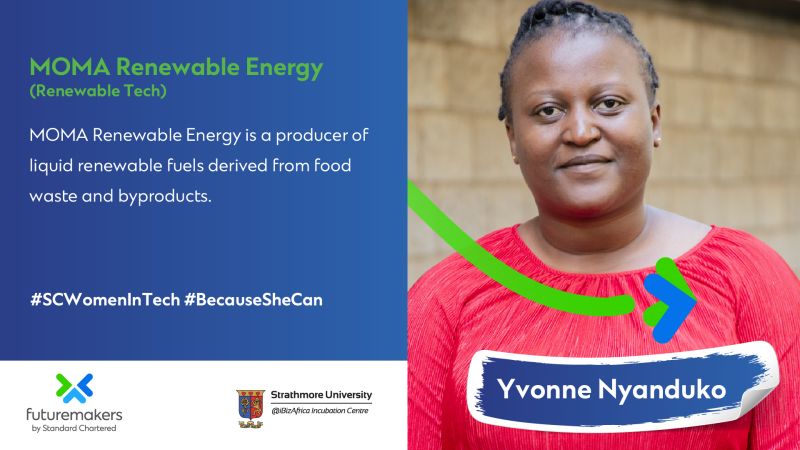MOMA Renewable Energy is a Kenyan renewable tech company that turns everyday food waste into affordable energy solutions. The company is using innovative liquid fuels to help reduce waste and create a cleaner environment.
Founded in 2019 by Yvonne Mose, MOMA Renewable Energy produces ethanol-based cooking fuel from food waste and byproducts, providing an eco-friendly alternative to traditional cooking fuels.
Despite Africa’s monumental fossil fuel and renewable energy potential, it faces high energy poverty levels. African countries are also faced with the challenge of how to balance energy security, climate change, and sustainable development objectives. According to a report from the International Renewable Energy Agency (IRENA) developed in collaboration with the African Development Bank,A large part of Africa has so far been left out of the energy transition: Only 2% of global investments in renewable energy in the last two decades were made in Africa, with significant regional disparities. Renewable energy has the potential to provide electricity to the 600 million Africans currently deprived of it, create jobs and stimulate industrialisation.
MOMA Renewable Energy, was part of the seven women-led startups that won the 2024 Women In Tech Incubator Program COHORT 7, alongside Gwiji for Women, Hayah Bloom, Zidallie-Nelly Alili , Zaoshinani and PsychCare.
The Standard Chartered Women in Technology Incubator Kenya is Africa’s leading incubator programme for female founded businesses, aligning with calls for more diversity in technology, entrepreneurship and for more opportunities for women to develop entrepreneurial and leadership excellence. The program is an initiative of Standard Chartered in partnership with @iBizAfrica Centre, Strathmore University.
TechMoran caught up with Yvonne Mose and here is what she shared with us.
Please tell us a bit about you. What’s your background and your areas of expertise?
I’m Yvonne Mose, the founder of MOMA Renewable Energy. I have a background in Natural Resource Management and sustainable development, with extensive experience in renewable energy solutions tailored to Africa’s unique energy and waste challenges. My expertise lies in biofuels, waste-to-energy technologies, and community-led economic development. I am passionate about building sustainable systems that address energy poverty and environmental degradation while creating opportunities for women and marginalized groups.
What prompted the creation of MOMA Renewable Energy, and what products do you offer?
MOMA Renewable Energy was born out of a desire to tackle two major challenges in Kenya – energy poverty and inefficient waste management. We produce biofuels like bioethanol and biodiesel using food waste and food processing by-products, which offers a renewable alternative to fossil fuels. Our bioethanol targets cookstove distributors, while our biodiesel serves small industrial clients needing a cleaner fuel source. This approach not only provides affordable, sustainable energy options but also gives food processors an eco-friendly solution for managing their waste.
What opportunities are there for biofuel products in Africa, and how big is this market?
Africa’s biofuel market is vast, with industries seeking sustainable fuel alternatives amid growing concerns about emissions and energy security. Currently, there’s high demand in sectors like transportation, manufacturing, and power generation. With Kenya and the East African region’s combined market potential in the hundreds of millions of dollars, the adoption of locally produced biofuels is a promising area. As industrial and residential consumers look for reliable energy sources, locally produced biofuels could significantly reduce Africa’s dependence on imported fuels and enhance energy resilience.
What are some challenges facing the adoption of renewable energy, and what must be done to ensure its adoption is successful in Africa?
Major challenges include high initial costs, limited access to financing, and inadequate infrastructure. To overcome these, there needs to be greater investment in affordable renewable technology, better policies to incentivize renewable energy production, and stronger financial support for entrepreneurs in this space. Collaboration between governments, private sector players, and communities will also be key in creating supportive ecosystems for renewable energy.
How have you benefited from the Women in Tech program?
The Women in Tech program has been instrumental in MOMA’s growth. Through it, we secured $10,000 in funding, which we are using to improve our technology and boost production capacity. The mentorship and networking have helped me refine our business model and connect with like-minded entrepreneurs and investors passionate about women-led ventures in renewable energy. This support has been crucial as we scale our operations and increase our impact.
The energy industry is deemed male-dominated; what are some challenges you have encountered as a female entrepreneur in energy?
Navigating a male-dominated industry has presented challenges, from limited networking opportunities to skepticism about women’s technical capabilities. However, I’ve found that building a reputation through expertise, commitment, and a skilled team can overcome these obstacles. I’m also committed to mentoring other women in the field to increase gender diversity and inclusivity in energy.
Any local competition, and how unique are you from them?
Our main local competitors primarily rely on sugar molasses for ethanol production, a resource affected by fluctuations in the sugar industry. In contrast, MOMA sources food waste directly from processors, allowing us more reliable and sustainable input for biofuel production. We’re also unique in our focus on creating employment for women, with an all-female production team and circular practices that benefit both our customers and the environment.

Is Kenya and Africa ready for such innovation like yours? Where do you see yourselves in two years?
Absolutely. Kenya and the broader African market are primed for innovative solutions that address energy poverty and environmental degradation. In two years, we aim to expand across East Africa, partner with larger cookstove distributors, and work with more industrial clients, positioning MOMA as a leading biofuels producer in the region.
How sustainable is this venture, and what is your business model?
MOMA Renewable Energy operates a circular and sustainable model, converting food waste into clean energy, thereby reducing landfill waste and lowering carbon emissions. We partner directly with food processors for waste sourcing and sell biofuels to cookstove distributors and small industrial clients. By scaling production with local resources and addressing waste management issues, we ensure our business is both impactful and sustainable.
What message would you give young Africans, particularly women, who see you as a role model?
My advice is to be fearless in pursuing solutions for the challenges you see in your communities. Be willing to take on the unknown, embrace learning, and make an impact. Especially for young women: your ideas and contributions are vital, and the future of Africa’s energy sector needs more women to drive it forward. Seek out mentors, build networks, and remember that resilience and dedication can pave the way for lasting change.

